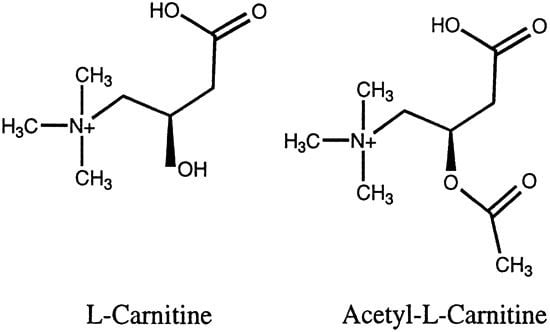
Researchers recently found a link between a lack of acetyl-L-carnitine in the blood and depression. Carnitine is a derivative of the amino acid lysine. Among other things, it is needed for fat burning, for proper brain, nervous system and muscle function, and it plays a role in immunity. Acetyl-L-carnitine is a form of carnitine that easily crosses the blood-brain barrier and therefore has beneficial effects on the brain and nervous system. Acetyl-L-carnitine can donate its acetyl group to other molecules (acetylation). This is important for the production of nerve growth factors (nerve growth factor), endorphins and neurotransmitters such as acetylcholine. Acetyl-L-carnitine also prevents the decline of receptors in the brain that are needed for neurotransmitter function. For example, it prevents the decrease of receptors for glucocorticosteroids, one of the consequences of chronic stress and a cause of cortisol resistance and impaired stress response (Ghirardi O, 1994). Cortisol resistance is one of the causes of mental and physical fatigue and depression. L-carnitine can be converted to acetyl-L-carnitine in the body by the enzyme carnitine acetyltransferase. The activity of the enzyme is reduced by oxidative stress (free radicals, lack of antioxidants), obesity and diabetes (Liu J, 2002; Seiler SE, 2014). Blood levels of acetyl-L-carnitine increase during fasting and after intense exercise (Adeva-Andany MM, 2017). People with clinical depression have lower blood levels of acetyl-L-carnitine than those without depression. The lower the blood levels, the more severe the depression. The greatest deficits are seen in people with therapy-resistant depression and in people who had a traumatic experience in childhood (especially emotional neglect) (Nasca C, 2018). Animal studies had previously found an association between acetyl-L-carnitine deficiency and depressive behavior. A lack of acetyl-L-carnitine appears to be one of the factors that cause one to develop depression in response to stress. Supplementation with acetyl-L-carnitine (intravenously or orally) in mice with a genetic form of depression or stress-induced depression has a rapid and long-lasting antidepressant effect (Nasca C, 2013). Also in humans, meanwhile, supplementation with acetyl-L-carnitine has been shown to improve depressive symptoms as much as antidepressants such as fluoxetine (Prozac), but without side effects. It also works faster (Chiechio S, 2017). The common dose for oral supplementation is 1,000 to 3,000 mg per day. Carnitine can be produced in the body from the amino acid lysine. It requires methionine, vitamin B6, B3, B12, folic acid, vitamin C and iron. A lack of carnitine is also a link between a lack of the B vitamins and depression. Never experiment on your own and be guided by an expert. References:
- Adeva-Andany MM, Calvo-Castro I, Fernández-Fernández C, et al. Significance of l-carnitine for human health. IUBMB Life. 2017 Aug;69(8):578-594.
- Chiechio S, Canonico PL, Grilli M. l-Acetylcarnitine: A Mechanistically Distinctive and Potentially Rapid-Acting Antidepressant Drug. Int J Mol Sci. 2017 Dec 21;19(1). pii:E11.
- Ghirardi O, Caprioli A, Ramacci MT, Angelucci L. Effect of long-term acetyl-L-carnitine on stress-induced analgesia in the aging rat. Exp Gerontol. 1994 Sep-Oct;29(5):569-74.
- Liu J, Killilea DW, Ames BN. Age-associated mitochondrial oxidative decay: improvement of carnitine acetyltransferase substrate-binding affinity and activity in brain by feeding old rats acetyl-L- carnitine and/or R-alpha -lipoic acid. Proc Natl Acad Sci U S A. 2002 Feb 19;99(4):1876-81.
- Nasca C, Bigio B, Lee FS, et al. Acetyl-l-carnitine deficiency in patients with major depressive disorder. Proc Natl Acad Sci U S A. 2018 Aug 21;115(34):8627-8632.
- Nasca C, Xenos D, Barone Y, et al.L-acetylcarnitine causes rapid antidepressant effects through the epigenetic induction of mGlu2 receptors. Proc Natl Acad Sci U S A. 2013 Mar 19;110(12):4804-9.
- Seiler SE, Martin OJ, Noland RC, et al. Obesity and lipid stress inhibit carnitine acetyltransferase activity. J Lipid Res. 2014 Apr;55(4):635-44.

